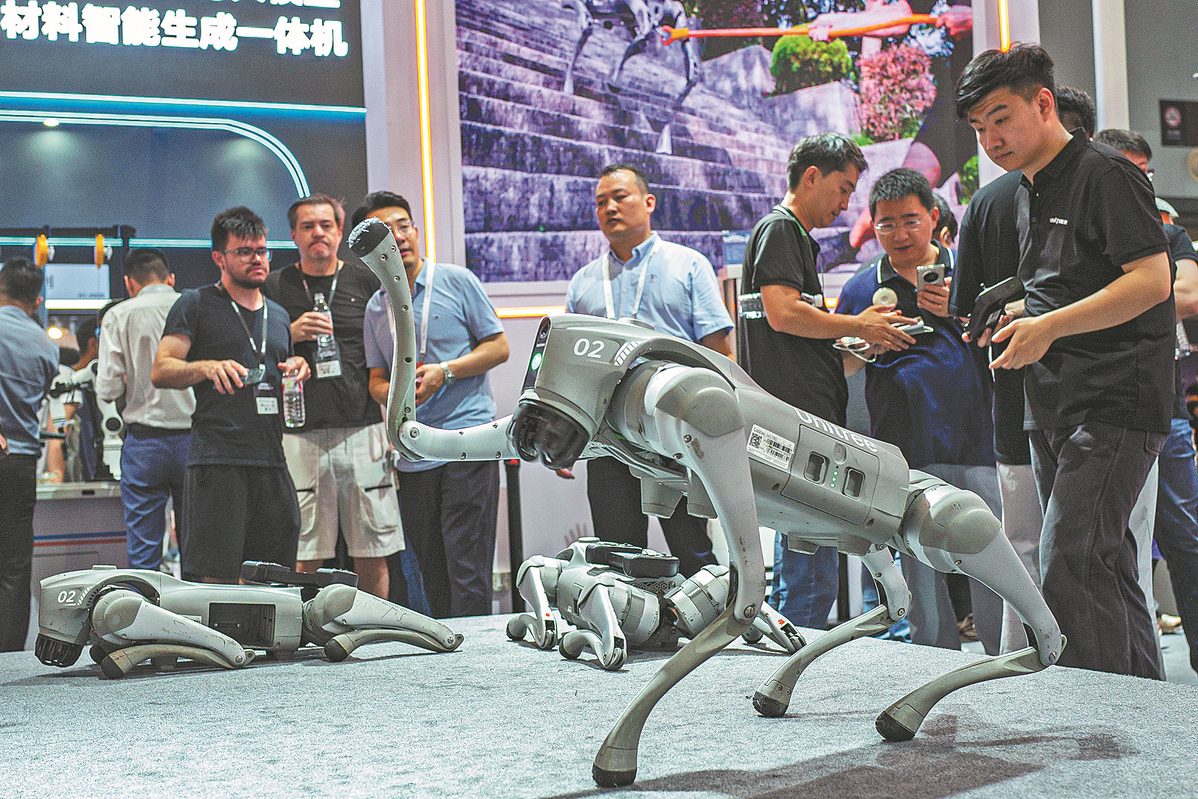
A quadruped robot developed by Unitree Robotics, a Chinese technology company based in Hangzhou, Zhejiang province, catches the attention of visitors at the World Artificial Intelligence Conference 2024 in Shanghai in July. PROVIDED TO CHINA DAILY
Zhejiang province is emerging as a national model for achieving common prosperity through high-quality development, anchored by accelerated growth in science and technology.
According to the Zhejiang Scientific and Technological Achievements Transformation Index 2024, which was released in December, the province's sci-tech index saw an average annual growth rate of 19.60 percent in the first three years of Zhejiang's 14th Five-Year Plan (2021-25) period, providing a powerful driving force for advancing the economy.
"This year marks the conclusion of the 14th Five-Year Plan and is a critical year for building a demonstration zone for achieving common prosperity through high-quality development," said Wang Hao, secretary of the Communist Party of China Zhejiang Provincial Committee, during the first meeting of Zhejiang authorities in the Year of the Snake, which started on Jan 29.
Zhejiang, an economic powerhouse in eastern China, was designated in 2021 as a demonstration zone for promoting common prosperity.
In 2024, Zhejiang's economic output surpassed 9 trillion yuan ($1.24 trillion), ranking fourth among the 31 provincial-level regions on the Chinese mainland.
Wang emphasized the need for breakthroughs in seven key areas to drive high-quality economic development, including innovating new quality productive forces, advancing high-level opening-up and boosting consumption.
Technological innovations that have originated in Zhejiang, including artificial intelligence applications by DeepSeek and Unitree Robotics, made headlines worldwide during the Chinese New Year holiday, highlighting the province's tech prowess.
Yu Jianxing, Party secretary of Zhejiang Gongshang University, said: "DeepSeek has given the Chinese people a New Year's gift. Many once believed that achieving a major breakthrough in AI innovation in China was nearly impossible. But Hangzhou's six emerging tech giants have accomplished achievements that have shocked the world."
Emphasizing that this is not just a technology issue, Yu said it also involves the comprehensive effects that forward-looking policies have on society as a whole.
"The key point is that we have gradually established a policy system geared toward common prosperity," he said.
Yu added that "one of the most remarkable accomplishments is the narrowing of the income gap between urban and rural residents". He noted that with the reduction in the gap, urban residents' income is now just 1.8 times that of rural residents, with some cities reducing it to around 1.6, among the lowest in China.
In terms of developing new quality productive forces, Zhejiang will focus on two major tasks: integrating education, science and talent reforms, and deepening the synergy between technological and industrial innovation.
"Zhejiang's institutional framework supports technological innovations at all stages — from production and mass manufacturing to financial backing," Yu said.
"Every step in the process finds investment and support," he added.
"This is not just a market business model or a government administrative framework. It is the construction of an innovative ecosystem," Yu said. "We should pay close attention to the start-ups of today that will evolve in 20 years from now into giants like DeepSeek and Unitree Robotics."
Zhejiang has already achieved remarkable results in its initiative to promote more than 1,000 major projects with an investment of 1 trillion yuan annually, which has supported the implementation of 203 provincial-level government investment projects, generating a total annual investment of more than 52.2 billion yuan.
A typical case is Yucun village in Anji county of Huzhou, Zhejiang. At the beginning of 2023, Anji proposed the "greater Yucun village" concept, centering on Yucun and integrating 24 administrative villages in three surrounding townships for coordinated development.
Today, the tea plantations around Yucun village have become popular tourist destinations in springtime, boosting tea farmers' income and significantly promoting the integration of agriculture, culture and tourism.